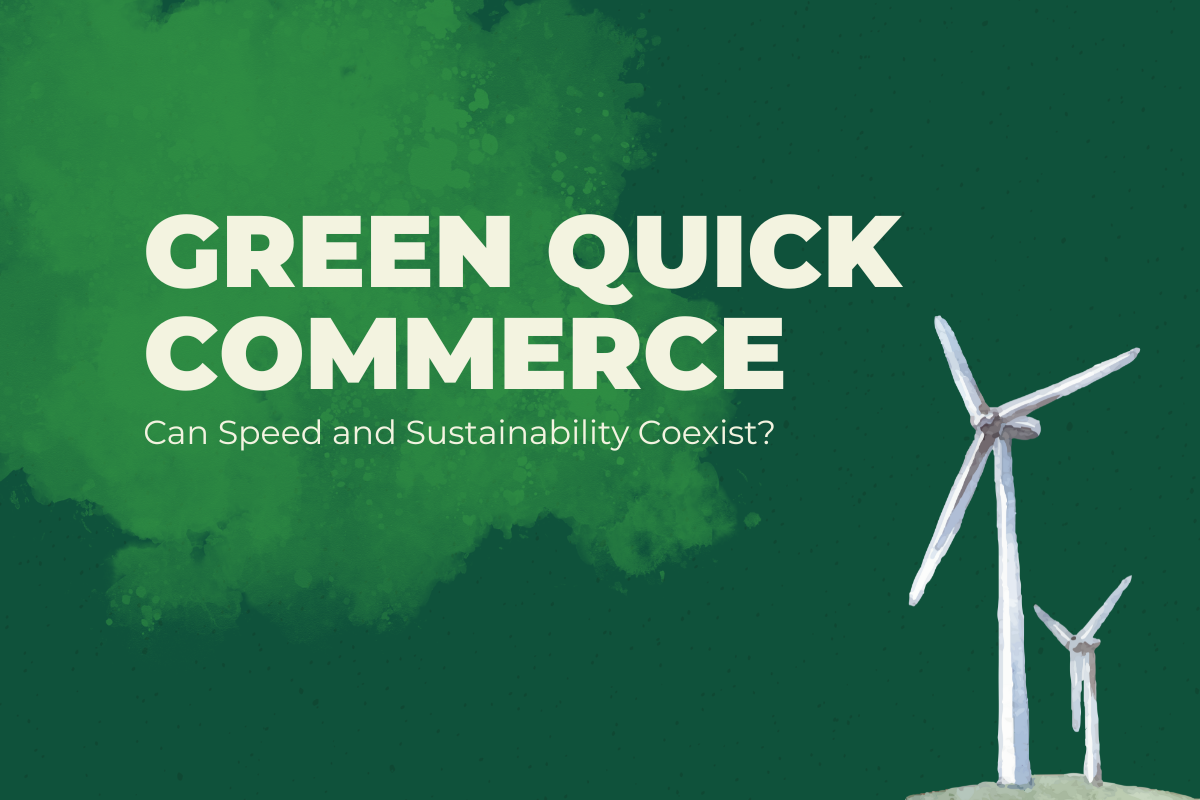The promise of getting groceries in 10 minutes feels magical—until you realize each delivery leaves a carbon trail. Can we keep the speed and ditch the damage?
While the model promises unmatched speed, its reliance on hyper-local hubs, short delivery timelines, and high packaging volumes poses real sustainability challenges. A forward-thinking Amazon marketing agency like AKOI believes the future of quick commerce must strike a balance between performance and planet.
Let’s explore whether speed and sustainability can truly coexist—and how marketers, brands, and eCommerce ecosystems can drive that change.
Understanding the Environmental Impact of Quick Commerce
The rise of quick commerce platforms like Zepto, Blinkit, Swiggy Instamart, and Amazon Fresh has added layers of logistics that didn’t exist in traditional retail or even standard eCommerce. Fulfillment centers now operate within neighborhoods, delivery fleets must move rapidly, and SKUs(Stock keeping units) must be managed in real-time.
This model introduces:
- Increased vehicle emissions from continuous, short-distance trips
- Higher use of disposable packaging to maintain product quality
- Greater energy consumption in micro-warehousing
- Wastage due to rapid stock turnover and shrinkage
Brands that want to compete in this fast-moving space—whether via platforms like Amazon or Flipkart—can no longer ignore the sustainability implications of their marketing and fulfillment strategies.
Marketing’s Role in Sustainable Quick Commerce
Here’s where agencies and marketplaces step in. From optimizing product discoverability to reducing unnecessary returns, marketing can play a surprisingly big role in lowering the carbon footprint of commerce.
An experienced ecommerce marketing agency or quick-commerce marketing agency can help brands shift from pure volume tactics to smarter, intent-based visibility strategies.
Key areas of focus include:
1. Smarter Product Listings
With high-speed shopping comes quick decision-making. Clear, optimized listings reduce the chance of product misunderstandings—and, therefore, returns.
Using targeted Amazon product listing services or Flipkart listing services, brands can ensure their listings include complete, accurate details, visuals, and size/variant clarity. This not only improves conversions but also reduces return-driven emissions and waste.
2. Eco-Conscious Ad Targeting
Campaigns run by an Amazon advertising agency or Amazon ad agency can now be aligned with consumer values. Messaging that highlights eco-friendly packaging, carbon-offset logistics, or sustainable sourcing can drive both clicks and conscience.
For example, a quick-commerce marketing company can help craft creative that doesn’t just push offers but promotes sustainability-first benefits—targeting customers who care about both time and impact.
3. Inventory and Fulfillment Optimization
By leveraging analytics and demand forecasting, brands can reduce overstocking and minimize wastage. This is where a data-driven ecommerce marketplace marketing agency can add real value, especially when working within Amazon’s backend systems or the Flipkart seller ecosystem.
Consumer Expectations Are Driving the Green Shift
Today’s consumers, especially Gen Z and millennials, are increasingly environmentally conscious. They want their purchases to align with their values, and that includes how those products are marketed, packaged, and delivered. A recent Nielsen report found that 73% of global consumers would change their consumption habits to reduce environmental impact. In the quick commerce space, where convenience once overshadowed sustainability, expectations are shifting.
This change presents a massive opportunity for brands. By aligning with eco-conscious values, businesses not only meet rising consumer expectations but also earn long-term loyalty. The role of a marketing partner becomes critical here—helping position sustainability not as a compromise, but as a core brand strength.
A Real-World Glimpse: Sustainable Positioning in Action
Let’s consider a brand that sells organic personal care products and partners with a quick-commerce platform. With help from an experienced ecommerce marketplace marketing agency, the brand optimized its Amazon listings to include biodegradable packaging claims, cruelty-free certification, and minimal carbon logistics. The results? A 25% uplift in click-through rates, and a measurable drop in product return rates—showing that conscious communication can drive both awareness and performance.
What Can Brands Do Now?
If you’re looking to future-proof your quick commerce presence while keeping environmental impact in mind, here’s where to start:
- Audit your listings across Amazon, Flipkart, and other platforms using professional Amazon listing services to ensure product information is complete, honest, and sustainability-forward.
- Highlight eco-values in ads by tapping into the capabilities of a seasoned Amazon advertising agency to create campaigns that reflect low-carbon logistics, plastic-free packaging, or local sourcing.
- Consolidate deliveries where possible by using data to create bundled delivery options or communicating eco-friendly shipping methods at checkout.
- Leverage analytics for efficient inventory, minimizing waste through accurate demand forecasting. An ecommerce marketing agency with backend expertise can reduce stock overages or under-delivery.
- Educate through content: Quick commerce doesn’t leave much time to explain. Use smart banner copy, bullet highlights, and review prompts to communicate sustainability simply.
- Measure your impact: Track return rates, delivery efficiency, and campaign performance with green KPIs in mind. Marketing aligned with measurable sustainability is far more powerful.
Closing the Loop: Strategy Meets Sustainability
The reality is clear—quick commerce is here to stay. But so is the growing pressure to make it responsible. Speed, when paired with sustainability, can be a differentiator rather than a compromise. Brands that integrate green thinking into their marketplace and marketing strategies now will set the standard for years to come.
AKOI, a performance-first Amazon marketing agency, helps brands navigate this balance. From smarter listings and ad placements to full-funnel strategy across quick commerce platforms, we believe growth is best when it’s built to last.
Partner with AKOI to power your quick-commerce success—responsibly.


